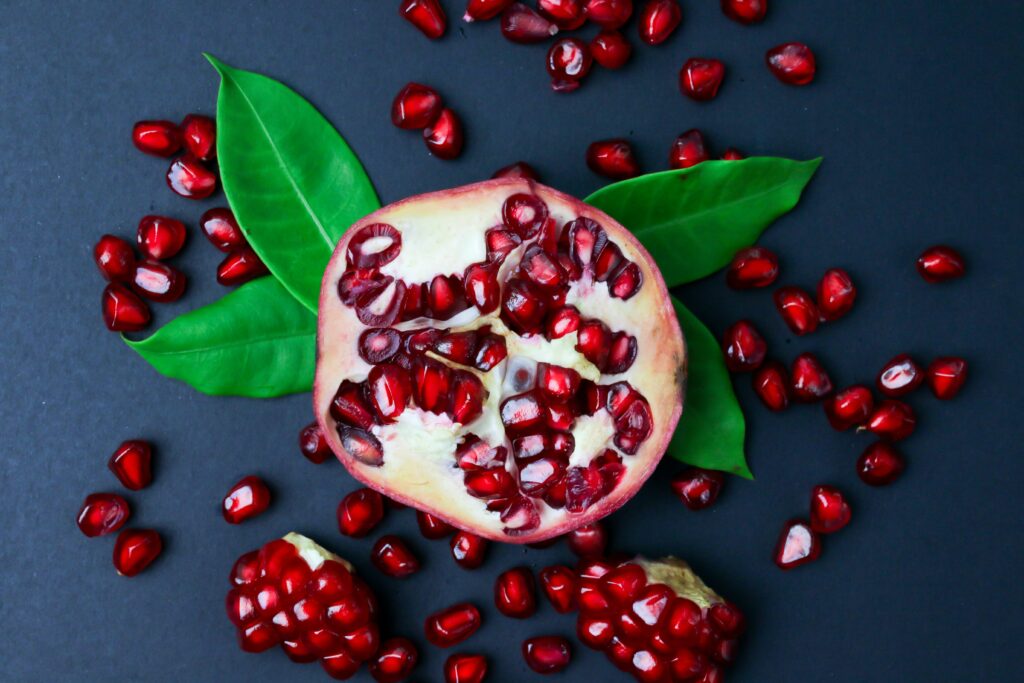Table of Contents

Pomegranates is a boon for health. Eating it has many health benefits. It is a mine of medicine. The antioxidants present in it prevent aging. By eating it daily, many types of diseases can be removed. If you don’t eat pomegranate fruit in the form of seeds, then drinking juice also has good benefits. Pomegranate is rich in vitamin C, which works wonders in boosting immunity. Moreover, this fruit improves memory.
Pomegranate contains 7 grams of fiber, 3 grams of protein, 30 percent vitamin C, 16 percent folate, and 12 percent potassium. A cup of pomegranate also contains 24 grams of sugar and 144 calories.
Two elements found in pomegranate make it a valuable fruit. These elements are punicalagin’s and punicic acid. Puniculgins contain antioxidants. Punicic acid contains punic fatty acids. Additionally, pomegranate has anti-inflammatory properties. They can fight diseases like diabetes, cancer, Alzheimer’s, and obesity.
Benefits of Pomegranates.
- Reducing Inflammation.
Pomegranates contain compounds that have anti-inflammatory properties, such as ellagic acid and punicalagin. Chronic inflammation has been linked to a variety of diseases, including heart disease, cancer, and diabetes. By reducing inflammation in the body, pomegranates may help lower the risk of these diseases. - Lowering Blood Pressure.
Hypertension is the most common disease in the primary care of patients. It is found in comorbidity with diabetes and cardiovascular disease, and the majority of patients do not tend to be medicated. Pomegranate juice prevents the activity of serum angiotensin-converting enzymes and reduces systolic blood pressure. - Improving Heart Health.
Antioxidants present in pomegranate act as a ‘thinner for your blood’. The seeds of a pomegranate prevent your blood platelets from forming clots and coagulating.
There are two types of blood clots, first is the good one that speeds the recovery during a cut or an injury and the second is when there is an internal clot, like in the heart, arteries, or anywhere else inside the body. These types of clots are not good and can be fatal.
With increasing age and the type of lifestyle we live, the walls of our arteries become harder due to cholesterol, resulting in blockages sometimes. The anti-oxidant property of pomegranate prevents bad cholesterol from oxidizing. So, eating pomegranates removes the excess fat and prevents the hardening of artery walls.
- Boosting Immunity
Pomegranates are a good source of vitamin C, which is important for a healthy immune system. Vitamin C helps produce white blood cells, which are responsible for fighting infections and disease. Pomegranates also contain other compounds that have antibacterial and antiviral properties, which can help protect against infections.
Protecting Against Cancer.
- Breast cancer Fermented pomegranate juice has double the antiproliferative effect compared to fresh pomegranate juice in human breast cancer cell lines MCF-7 (breast cancer cell line isolated in 1970 from a 69-year-old Caucasian woman) and MB-MDA-231. In addition, pomegranate seed oil caused 90% prevention of the proliferation of MCF-7 cells.
- Lung cancer Pomegranate fruit extract can inhibit several signaling pathways, which can be used in the treatment of human lung cancer. Pathways include Mitogen-activated protein kinases (MAPK) PI3K/Akt and NFκB. In addition, there was a 4-day delay in the appearance of tumors (from 15 to 19 days) in mice implanted with A549 cells.[10] These studies indicate the chemopreventive effects of pomegranate fruit extract.
- Colon cancer Adams et al.[11] have reported the anti-inflammatory effects of pomegranate juice on the signaling proteins in the HT-29 human colon cancer cell line. Reduction in phosphorylation of the p65 subunit of NFκB, it is binding to the NFκB response, and 79% inhibition in TNF-α protein expression has been observed with 50 mg/L concentration of pomegranate extract.
- Prostate cancer After lung cancer, the second leading cause of male cancer death is prostate cancer worldwide. Its progress before the onset of symptoms is slow; therefore, pharmacological and nutritional interventions could affect the quality of a patient’s life by delaying its development.
Helps maintain blood sugar levels:
Helps maintain blood sugar levels: Pomegranates may help regulate blood sugar levels, which is important for preventing and managing type 2 diabetes. The polyphenols in pomegranates may help improve insulin sensitivity and reduce insulin resistance, which can lead to better blood sugar control.
Improves digestion:
Pomegranates are high in fiber, which is important for maintaining healthy digestion. Fiber helps regulate bowel movements, prevent constipation, and feed the beneficial bacteria in your gut. Pomegranates also contain compounds that have anti-inflammatory properties, which can help reduce inflammation in the gut and improve digestive health.

Side effects of Pomegranates.
Pomegranates are generally safe for most people to consume as part of a healthy diet. However, in some cases, pomegranates may cause side effects or interact with certain medications. Here are some potential side effects of pomegranates:
- Allergic reactions: Some people may be allergic to pomegranates or experience an allergic reaction after consuming them. Symptoms of an allergic reaction may include itching, hives, swelling, and difficulty breathing.
- Interactions with medications: Pomegranates may interact with certain medications, including blood thinners and medications for high blood pressure. Pomegranates may also interfere with the metabolism of some drugs, making them less effective.
- Upset stomach: Eating large amounts of pomegranates or drinking pomegranate juice may cause stomach upset, diarrhea, or nausea in some people.
- Interference with medical tests: Pomegranates contain a compound called punicalagin, which can interfere with certain medical tests, including prostate-specific antigen (PSA) tests for prostate cancer.
- Possible effects on pregnancy: There is limited research on the effects of pomegranates on pregnancy. Some studies suggest that pomegranate extract may have uterine-stimulating effects and could increase the risk of miscarriage or preterm labor. Therefore, pregnant women should consume pomegranates in moderation or consult with their healthcare provider before adding them to their diet.
conclusion:
In conclusion, pomegranates are a highly nutritious fruit that offers a wide range of health benefits. Packed with antioxidants, anti-inflammatory compounds, fiber, and vitamins, pomegranates can help protect the body from chronic diseases, improve heart health, boost immunity, aid digestion, and regulate blood sugar levels. However, it is important to note that consuming pomegranates may cause side effects in some people, and they may interact with certain medications. As with any dietary change, it is always a good idea to consult with a healthcare provider before incorporating pomegranates into your diet, especially if you have any underlying medical conditions or are taking any medications. Overall, adding pomegranates to your diet can be a delicious and nutritious way to support your health and wellbeing.
Disclaimer:
The benefits and side effects of pomegranates is intended for educational purposes only and should not be considered medical advice. The information provided is not intended to diagnose, treat, cure, or prevent any disease, and it should not be used as a substitute for professional medical advice, diagnosis, or treatment. Always consult with a qualified healthcare provider before making any changes to your diet or lifestyle, especially if you have any underlying medical conditions or are taking any medications. The use of this information is solely at your own risk.